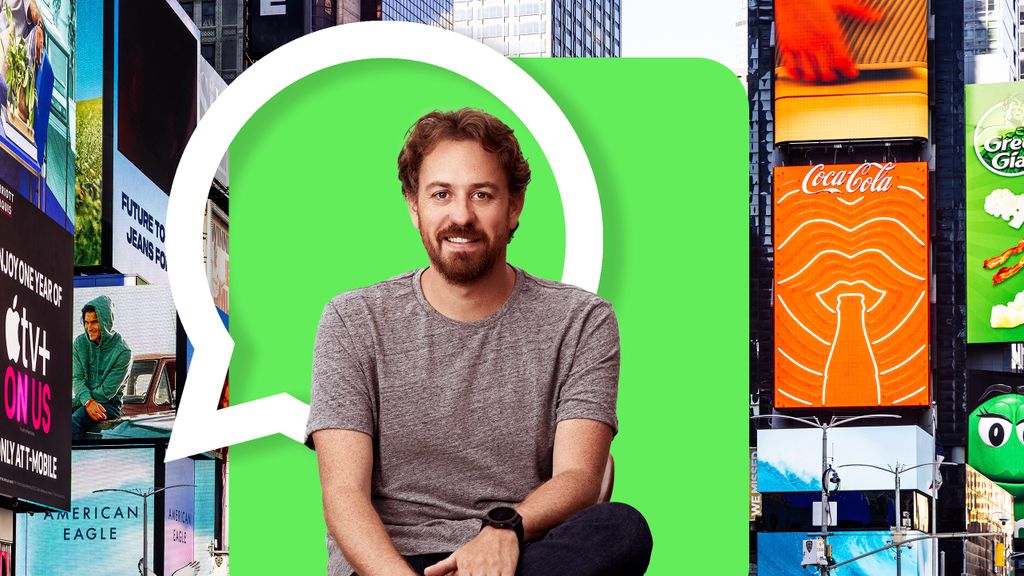Will Cathcart is responsible for WhatsApp at Meta.
[M] Carolin Klemm / DER SPIEGEL; Fotos: Alexander Spatari / Getty Images, Meta
In Meta’s family of apps, which together shape the everyday internet use of billions of users around the world, WhatsApp has always been the exception. While Facebook and Instagram are full of personalized advertisements, the messenger app Mark Zuckerberg acquired in 2014 remained ad-free.
That has now changed for certain elements of the app. The WhatsApp home screen, where the chats are listed, will remain untouched, as will the private and group chats. They will also continue to be end-to-end encrypted. But ads will soon begin appearing in the "Updates” tab. According to Meta, the tab is used by 1.5 billion users
There will be two kinds of ads:
In the Updates section (German: "Aktuelles"), personalized ads, customized for the user’s profile, will appear among the status updates of friends and contacts.
WhatsApp advertising material: This image shows how the new features will look.
Whether users will be given the option in the future to opt out of those ads for a subscription price, and what that price might be, is unclear.
As part of the app overhaul, WhatsApp is also introducing a third change: Those who operate channels, such as influencers, will be able to offer exclusive content to their followers for a monthly fee. In the long term, Meta plans to pass 90 percent of such subscription revenues on to channel operators – and 100 percent in the introductory phase.
WhatsApp took steps some time ago in an effort to earn money with the app. Companies, for example, can take advantage of paid alternatives to ad text messages. Companies can also present themselves with channels and be directly addressed by customers. Thus far, however, the app has not hosted traditional advertising spaces.
The changes announced on Monday are a significant step and a break from long-standing practices. In a video interview with DER SPIEGEL, WhatsApp CEO Will Cathcart explains his company’s new strategy.
Alex Welsh / NYT / Redux / laif / The New York Times
Will Cathcarthas been "Head of WhatsApp" for Meta since 2019. He has worked for Mark Zuckerberg's company, which used to be called Facebook, since 2010. According to Meta, he was head of product development for the Facebook News Feed, among other tasks. Before working for Zuckerberg, Cathcart was a product manager at Google with a focus on anti-spam technologies. He earned his bachelor's degree in Mathematical Economics at Colgate University in the state of New York.
DER SPIEGEL:Mr. Cathcart, there is a quote you have surely heard many times before: "No ads! No games! No gimmicks!” In the early years, WhatsApp co-founder Jan Koum kept this handwritten note on his desk. Now, ads are coming to WhatsApp. How big of a change is this for the service?
Will Cathcart:If you go back many years, WhatsApp did not have an Updates tab. It was only your messaging experience, and that’s the approach we have still taken for your messaging experience. We have been able to build a business that I think matches how people want to use messaging. It doesn’t get in the way of their inbox. The Updates tab is different, and I think people use it differently. Stories, for example, fit in there in the same way stories fit into Instagram or Facebook.
DER SPIEGEL:Jan Koum and his co-founder Brian Acton no longer work at Meta. But they were both very critical of advertising, calling it an "insult to your intelligence” and an "interruption of your train of thought.”
Cathcart:Ads can interrupt you when you are trying to have a conversation with someone. But it's very different when you’re browsing through a directory looking for new channels. It's on us and the businesses to make ads relevant. When an ad is relevant to you or local to you, it can be really interesting. I myself find new products all the time when scrolling through stories on Instagram.
The changes to WhatsApp are being made in the Updates tab, as seen here, not in the chat area.
DER SPIEGEL:How often will people see ads when they swipe through WhatsApp status updates?
Cathcart:We don't have an exact number, but conceptually our product is similar to how stories work on Instagram. But obviously, ad frequency depends on having the right ads to show people and also how much you use the Status area. If you're someone who doesn't use Status, you won't see any ads. And if you are somebody who uses Status a lot, then we might have multiple chances to show you a relevant ad.
DER SPIEGEL:Over the years, there have been many rumors about WhatsApp introducing ads, but you and your company often denied them. In a DER SPIEGEL interview just last year, your product chief said there was no timetable.
Cathcart:At times, there have been rumors around us putting ads in the inbox, and I have definitely denied such plans. But I've also said publicly that we were thinking about putting ads in Status. And that's different.
DER SPIEGEL:Why would advertisers buy ad space on WhatsApp if they can't have access to the inbox, the most prominent part of the app?
Cathcart:One category of our business customers includes very, very small companies that don't have other ways to talk to customers. Think of, say, a hairdresser in São Paulo. They can already run ads on Facebook and Instagram, where the button says: "Message me on WhatsApp.” They don't have to build a website or an app, it just works for them. Now they can run these kinds of ads on WhatsApp directly.
DER SPIEGEL:Usually, the more you can personalize ads, the more advertisers are willing to pay. But because of WhatsApp's focus on encrypted chats, you do not know much about your user's interests – in contrast to Facebook, where most of the content is public. It would seem, then, that the best way to monetize WhatsApp would be through users connecting the app to their Facebook or Instagram account.
Cathcart:We will give users the option to link their accounts. Germany will get this choice at a later date. By default, it's off, you don't have to link. We think some users will do it – for example, syncing their Meta AI chats across all apps. Or maybe they own a business and manage an Instagram presence and a WhatsApp presence, so they will connect the accounts. And yes, if you do, we will have more personalized ads for you, because of your Facebook and Instagram data. But some users won't link their accounts, and that's fine.
DER SPIEGEL:Will there be pop-ups on WhatsApp promoting the account connection?
Cathcart:We will tell people in the Updates tab about our new features, and we'll walk them through them. A lot of people post to WhatsApp Status and want to share that same post to Instagram. That's an area where we would suggest connecting the accounts. But if you're using WhatsApp only to send messages, we don't want to bother you.
DER SPIEGEL:What targeting options will you be offering advertisers to reach users who don’t link their accounts? Will advertisers be able to approach people of a certain age, income class or location?
Cathcart:The data we're using to deliver these ads includes general location – what country are you in, what city are you in – and age, for those users for whom we know it. Advertisers can target age buckets and some of your interests, in terms of what channels you're following or how you're interacting with ads. The targeting options will vary over time.
DER SPIEGEL:Many users are convinced Meta is tapping into their phones in order to show Facebook and Instagram ads according to their private conversations. Ads on WhatsApp will no doubt add fuel to this fire. What do you have to say to these people?
Cathcart:We want to be really clear on this: Your personal conversations are end-to-end encrypted. We cannot see them. We cannot hear your calls. We are not listening to what you say at all, let alone using it for ads.
DER SPIEGEL:WhatsApp says there will be no ads in private conversations, but you could put an ad space above the chat or below the chat, or on the app start screen. Can you promise that you won't do this in the next two years?
Cathcart:I know other messaging services have done it. It’s just not something we're focused on. In your inbox, you have limited visual space. You can only see a certain number of threads. Here, we want you to focus on people who have reached out to you.
DER SPIEGEL:WhatsApp's revenues seem to have become increasingly important to Meta's bottom line of late. Did Mark Zuckerberg finally give you the order to monetize WhatsApp’s gigantic user base and get a return on his $19 billion purchase price for the app?
Cathcart:We are obviously not the biggest part of Meta's business, but WhatsApp is a growing and successful business with revenues in the billions. We do generate a significant amount more than it costs to operate WhatsApp.
DER SPIEGEL:WhatsApp is profitable on its own?
DER SPIEGEL:You are also planning to allow content creators and influencers to make money from the app through their channels. Will they be able to set their own prices? Could one creator take 5 euros per month for a subscription and another 50 euros?
Cathcart:Yes, creators will be able to choose themselves what the rate is.
DER SPIEGEL:But will there be a permissible range? Or can someone, for example, charge 1,000 euros for his or her "how to make money fast” channel?
Cathcart:There will be a price range and also an upper price limit.
DER SPIEGEL:Will really everyone be able to monetize their channel? Or will there be a minimum number of subscribers necessary before creators are allowed to use this option?
Cathcart:There will certainly be some thresholds. We're just going into early testing with some hand selected initial partners. Over time we'll see where the limits are. We've done that with Channels, too, by the way. In the beginning, we limited whose channels were easy to find, and over time we have been able to relax them as we have better understood the system. We'll be cautious to start.
DER SPIEGEL:Will you share your new ad revenue in any way with creators or influencers?
Cathcart:There will be no ads showing up next to a specific channel. So no, that's not the plan.
DER SPIEGEL:In Germany we just recently got the Meta AI feature, and some users have complained that they don't want the feature in the app, saying they didn’t want the distraction. Now, you’re adding advertisements and paid channels on top. Are you not afraid of driving away users?
Cathcart:Features like Meta AI, stories and channels are optional. You don't have to use them. I know that not everyone uses every feature and that everyone wishes maybe this or that feature didn't exist. But we're trying to serve a global audience that has a range of needs. So we're trying to do our best to make something that's available for those who want it and unobtrusive for those that do not.







